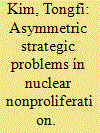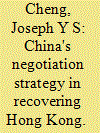|
|
|
Sort Order |
|
|
|
Items / Page
|
|
|
|
|
|
|
| Srl | Item |
| 1 |
ID:
138093


|
|
|
|
|
| Summary/Abstract |
This article explains cooperation problems between powerful democratic states and weak non-democratic states in the context of nuclear nonproliferation. Focusing on the interactions of the United States with North Korea, Iran, and Libya, it suggests that power asymmetry and information asymmetry foster mutual distrust by exacerbating two main strategic obstacles to cooperation: the time inconsistency of the stronger state’s policy and the incomplete information regarding the nondemocratic states. The nature of negotiations over nuclear weapons programs further exacerbates these problems. The overall implications of this article leave us pessimistic about the possibility of negotiated nuclear disarmament, but the theoretical analysis may help the negotiation strategy of the United States.
|
|
|
|
|
|
|
|
|
|
|
|
|
|
|
|
| 2 |
ID:
186187


|
|
|
|
|
| Summary/Abstract |
How do voters want their governments to respond when another country unilaterally withdraws from an international institution? We distinguish between negotiation approaches that vary in the degree to which they accommodate the withdrawing state's demands and argue that negotiation preferences are shaped by two issues. The first is voters’ exposure to the costs and benefits of accommodation. This exposure varies across issues, and we argue that citizens will generally prefer non-accommodation on zero-sum issues, but support more accommodation on cooperation issues, where non-accommodation puts existing cooperation gains at risk. Second, withdrawal negotiations create precedents, and citizens should therefore be less willing to accommodate the more they are concerned about the ripple effects of accommodation on the institution's stability. These concerns also confront citizens with two types of dilemmas depending on how favorably they view the institution themselves. To test our argument, we use survey evidence and a conjoint experiment conducted in Germany and Spain during the Brexit negotiations. We find that respondents overall are more willing to accommodate the UK on cooperation issues than on zero-sum issues, but also find evidence that Euroskeptics and Europhiles confront different issue-specific dilemmas. Our paper contributes to a better understanding of the dynamics surrounding the challenges to multilateralism that have proliferated in recent years.
|
|
|
|
|
|
|
|
|
|
|
|
|
|
|
|
| 3 |
ID:
116639


|
|
|
|
|
| Publication |
2012.
|
| Summary/Abstract |
This article focuses on Beijing's negotiation strategy and its preparations regarding the conclusion of the Sino-British Joint Declaration. The negotiation process is divided into several important stages, and a framework is offered for further research. The Chinese decision-making processes before the negotiations startedwere detailed and scientific. The decision to recover Hong Kong by 1997 was certainly influenced by nationalist considerations, andChinese leaders werewilling to pay the price. The "one country, two systems" policy for Hong Kong demonstrated the Chinese leadership's liberation in thinking at that time, and that it was ready to adopt a set of highly pragmatic guidelines to secure the confidence of the Hong Kong people and to maintain the territory's stability and prosperity. In contrast, the British side did not have a good understanding of the situation in China. In particular, the British seriously neglected the impact of nationalism on the Chinese leadership and the Hong Kong people.
|
|
|
|
|
|
|
|
|
|
|
|
|
|
|
|
| 4 |
ID:
185657


|
|
|
|
|
| Summary/Abstract |
Climate change emerged as a serious diplomatic concern for India in the early 1990s. India has since been a staunch champion of the developing world, in multilateral climate negotiations; from playing a key role in establishing the principle of common but differentiated responsibility and respective capabilities, to forging alliances with countries with shared developmental concerns. Faced with the growing impact of climate change and changing geopolitics, India’s foreign policy on climate change has undergone significant shifts during two decades of multilateral climate talks. First, India’s willingness to undertake domestic climate action as a result of its changing economic status and, second, the role of the political leadership—since Prime Minister Narendra Modi came to power in 2014—in shaping the climate discourse both in the country and abroad. India has, in recent years, shed its defensive, naysayer strategy at climate negotiations and led several multilateral initiatives for climate action. As India celebrates 75 years of its Independence, it is forging a new, confident leadership on issues of climate change. While there is continuity in India’s traditional stance on finance and technology transfer during negotiations, Indian foreign policy has begun to display a marked change in the strategic use of climate change to assert greater power on the global stage.
|
|
|
|
|
|
|
|
|
|
|
|
|
|
|
|
| 5 |
ID:
160346


|
|
|
|
|
| Summary/Abstract |
A successful North Korea–U.S. summit is expected to make a breakthrough in the
denuclearization of the North. Nevertheless, considering the lessons learned from
past denuclearization negotiations, and Pyongyang’s nuclear capacity and will
for nuclear development, a solely optimistic outlook is not advisable. In order to
pursue successful denuclearization negotiations, a precise understanding of new
negotiation conditions, particularly each party’s negotiation strategy and leverage,
and application of them is very important. Also, a substantive negotiation strategy
and roadmap for the denuclearization should be prepared to be able to pressure and
reach an agreement with North Korea. Taking account of the negotiation leverage
of North Korea and the United States, a one-sided negotiation with North Korea
surrendering to the United States is not likely. This paper aims to provide a practical
negotiation strategy and a roadmap for the denuclearization of North Korea
reflecting the current security situation surrounding the Korean Peninsula.
|
|
|
|
|
|
|
|
|
|
|
|
|
|
|
|
|
|
|
|
|